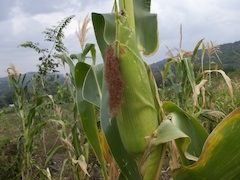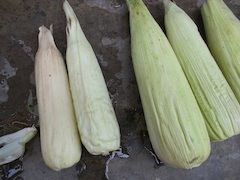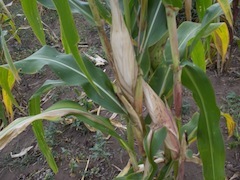BLOG: Reaping the benefits in Uganda
By Susie Weldon, August 12, 2013:
 |
 |
 |
The benefits from Farming God's Way show in this healthy corn cob. |
The weather has been baking hot in the week that I've been in Uganda but
rain has finally fallen on the capital city Kampala – and you can almost
hear the trees and shrubs sighing in relief. Uganda has been through a
long period of very hot, dry weather, with devastating consequences for
farmers.
Driving through the countryside, you can see the lack of rain in the maize
stalks that rise, dried, bleached and withered, above the dusty earth.
Everyone I spoke to told me: “So many crops have failed, there was almost
100% failure. There are difficult times ahead; food prices will rise.”
And people will go hungry, was the unspoken thought hovering on the edge
of these conversations.
So it was wonderful to hear one of our faith partners, Hajjat Sebyala
Aphwa, exclaim excitedly: “Susie, this Farming God’s Way really works!”
Hajjat, who runs a women’s environment project for Muslim women, was one
of several Muslim and Christian faith partners funded by ARC to attend a
training course in Farming God’s Way (FGW) in January this year. FGW is a
Christian approach to sustainable agriculture which is based on minimum
disturbance of the soil.
 |
 |
 |
A comparison with conventionally farmed corn shows how Farming God's Way improves the quality of produce. |
Afterwards, she used the FGW techniques on her land. “This is the maize I
grew using Farming God’s Way. And this is the maize that was not Farming
God’s Way,” she said, showing me this photograph (right).
As you can see, the FGW maize was twice the size of the traditionally
farmed maize. Other photos showed the cob plant looking dry and withered
on the stalk, compared to a green and healthy FGW maize plant.
This, after a prolonged dry period! I was excited to hear of Hajjat’s
first experience using Farming God’s Way - particularly she'd not had time
to prepare her vegetable garden properly as required.
"The soils were not exactly undisturbed but the results are encouraging,"
she told me. "Despite the fact that we have had a very prolonged drought
from early June into July, the FGW garden was able to somehow withstand it
and to give a good, healthy maize yield.
 |
 |
 |
Conventional farming has given poor yields during the drought. |
“Whilst the conventional gardens were drying off, those under FGW were
still green and healthy. Most farmers doing it the conventional way had
failed maize crops but FGW had a 50% survival rate, despite all the
challenges.”
Farming God’s Way – and Farming in Allah’s Way, a Muslim approach to
agriculture which we will launch later this year – will play a big part in
the new network of faith groups working on the environment which we are
establishing in Uganda.
The network will be a platform for encouraging environmental action by
faith groups, sharing ideas and experience, and building partnerships with
other organisations working on sustainable land management.
Our faith partners’ aim is, of course, to improve their people’s lives by
helping them produce more food without damaging their environment, both
now and for future generations. Farming God’s Way can help them do that.
Unfortunately, it can’t do much about the biggest problem Hajjat
encountered with her first FGW maize crop. “Many people resorted to
stealing from our FGW as the cobs were really big, healthy and
attractive,” she said.
Then she shrugged philosophically. “I understand why – they needed food.”
Read more about Farming God's Way here.
Read another blog about Farming God's Way in Tanzania here.
|

